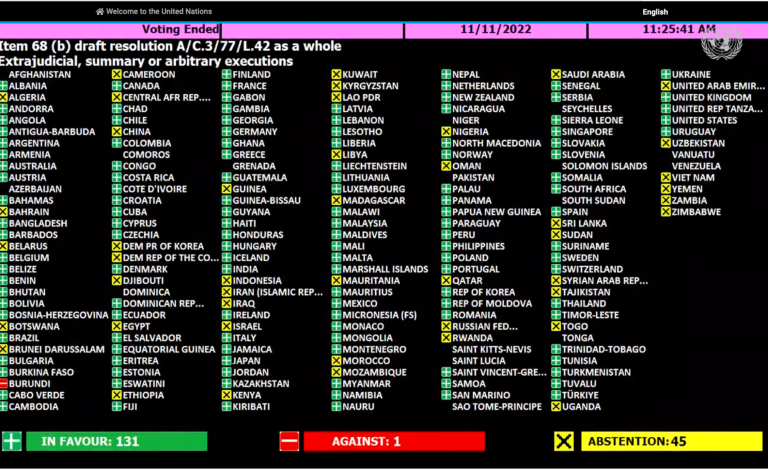
Insights
What’s in a Resolution? Why UN Language Should Matter to LGBTIQ People
Region(s)
TOPIC(s)
Type
Commentary
Author(s)
Publish Date
December 16, 2022
Share
What difference does a United Nations resolution make? And why should lesbian, gay, bisexual, transgender, intersex, and queer (LGBTIQ) people be interested in what takes place at the UN General Assembly?
At the General Assembly, all 193 member states discuss global concerns, including human rights, and make decisions and recommendations for action, including in the form of resolutions. The Universal Declaration of Human Rights, which has fueled the modern human rights movement, was itself part of an early General Assembly resolution. Because the General Assembly includes approximately 65 states that criminalize same-sex intimacy, it rarely tackles issues related to sexual orientation and gender identity head-on. Still, this political body can be used as a space to discuss issues related to LGBTIQ people’s human rights and to make progress, little by little.
Recently, LGBTIQ advocates celebrated the 20th anniversary of the first-ever reference to sexual orientation in a General Assembly resolution. This recurring resolution calls on states to promptly investigate all extrajudicial killings, including those based on sexual orientation—a first step toward holding states accountable for addressing violence against sexual and gender minorities. The term “gender identity” was added to the text in 2010. Then, in December 2021, the General Assembly made history when it adopted the second resolution that referenced sexual orientation and gender identity since the creation of the UN. This resolution addressed the difficulties that certain groups face in accessing election rights and participating in democracy—including on grounds of sexual orientation and gender identity. This November, the General Assembly also passed the first resolution to use terminology about “same-sex relations.” The resolution expressed concern about Iran’s treatment of minorities, including for the death penalty as punishment for same-sex relations. To date, no UN resolution addresses the human rights of intersex people.

The inclusion of language about sexual orientation, gender identity, and sex characteristics in UN resolutions is important for a variety of reasons. It sets an international precedent, opens up political discourse, and allows for more elevated action and discussion about these topics in other UN fora. States and UN agencies might use inclusive UN language to guide programming and to determine how they direct funding and resources, such as to populations most vulnerable to HIV/AIDS or to LGBTIQ people facing challenges as a result of armed conflict. Resolutions can also raise international visibility about LGBTIQ people and create more widespread acceptance of LGBTIQ people’s fundamental rights. They can provide fuel to pro-LGBTIQ policy-makers who seek to address human rights abuses and create legal protections for LGBTIQ individuals, mobilizing the moral and political force of the UN to confront resistance in their own countries. Finally, civil society and other stakeholders can hold member states accountable for their commitments to the rights of LGBTIQ people in UN resolutions.
Because of the rhetorical power of UN resolutions, however, anti-rights groups and states hostile to LGBTIQ people’s rights fight just as hard to keep inclusive language out of resolutions as groups like Outright International fight to keep it in. Anti-rights groups are active and well-funded in the international arena, and large coalitions of states have advocated for the removal of inclusive language in UN resolutions, lending more urgency to the struggle for inclusivity.
Adopting inclusive resolutions is, of course, only a first step in advocacy efforts: states must also implement them. Further, the scope of resolutions that reference sexual orientation and gender identity is extremely limited. Outright International aims to achieve full inclusion of LGBTIQ people at the UN, including consideration of all aspects of life that fall under the UN’s broad mandate to address “economic, social, cultural, or humanitarian” problems and promote human rights for all. Pushing for more inclusive resolutions on topics like sustainable development, peacebuilding, and humanitarian emergencies will be a crucial element of progress toward the holistic recognition and inclusion of LGBTIQ people everywhere in all spheres of life.

Take Action
When you support our research, you support a growing global movement and celebrate LGBTIQ lives everywhere.
Donate Now